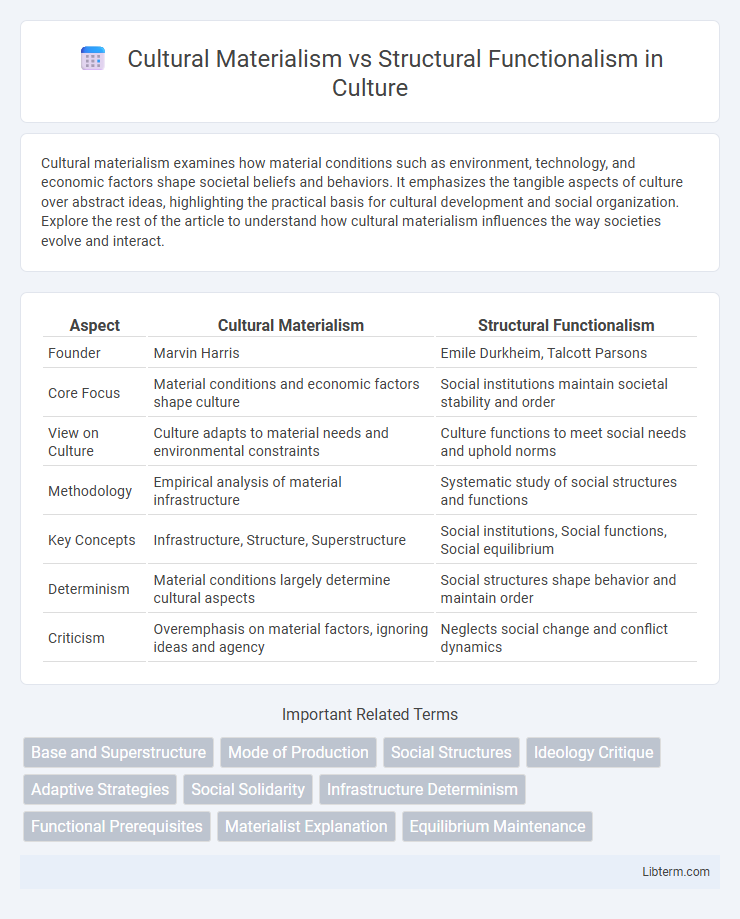Cultural materialism examines how material conditions such as environment, technology, and economic factors shape societal beliefs and behaviors. It emphasizes the tangible aspects of culture over abstract ideas, highlighting the practical basis for cultural development and social organization. Explore the rest of the article to understand how cultural materialism influences the way societies evolve and interact.
Table of Comparison
| Aspect | Cultural Materialism | Structural Functionalism |
|---|---|---|
| Founder | Marvin Harris | Emile Durkheim, Talcott Parsons |
| Core Focus | Material conditions and economic factors shape culture | Social institutions maintain societal stability and order |
| View on Culture | Culture adapts to material needs and environmental constraints | Culture functions to meet social needs and uphold norms |
| Methodology | Empirical analysis of material infrastructure | Systematic study of social structures and functions |
| Key Concepts | Infrastructure, Structure, Superstructure | Social institutions, Social functions, Social equilibrium |
| Determinism | Material conditions largely determine cultural aspects | Social structures shape behavior and maintain order |
| Criticism | Overemphasis on material factors, ignoring ideas and agency | Neglects social change and conflict dynamics |
Introduction to Cultural Materialism and Structural Functionalism
Cultural Materialism, pioneered by Marvin Harris, emphasizes the material conditions and economic factors as primary drivers of societal development and cultural practices. Structural Functionalism, developed by Talcott Parsons, views society as a complex system whose parts work together to promote stability and social order through shared norms and institutions. Both frameworks analyze social systems but differ in their focus on tangible infrastructure versus abstract social functions.
Historical Development of Both Theories
Cultural Materialism, developed by Marvin Harris in the 1960s, emerged as a reaction to earlier anthropological theories, emphasizing material conditions such as environment and economic factors as primary drivers of cultural development. Structural Functionalism, pioneered by Emile Durkheim and refined by Talcott Parsons in the early 20th century, focused on social structures and their roles in maintaining societal stability and cohesion. Both theories shaped anthropological and sociological thought by highlighting different aspects of social organization and cultural change through historical contexts.
Key Proponents and Influential Scholars
Key proponents of Cultural Materialism include Marvin Harris, who emphasized material conditions as primary drivers of cultural practices, while influential scholars like Roy Rappaport contributed to understanding the interplay between environment and culture. Structural Functionalism is chiefly associated with Emile Durkheim and Talcott Parsons, who analyzed society as an interconnected system with each part serving a function to maintain social stability. Both frameworks offer foundational perspectives in anthropological theory, shaping the analysis of cultural and social dynamics.
Core Concepts: Materialism vs. Structure
Cultural Materialism emphasizes the primacy of material conditions such as economic factors, technology, and environmental resources in shaping culture and social behavior. Structural Functionalism centers on the idea that society is a complex system of interrelated structures, each fulfilling essential functions to maintain social stability and cohesion. The core distinction lies in Cultural Materialism's focus on tangible material influences versus Structural Functionalism's emphasis on abstract social structures and their functions.
Methodological Approaches and Research Strategies
Cultural Materialism employs a scientific, empirical methodology emphasizing material conditions and economic factors to explain cultural phenomena through observable data and quantitative analysis. Structural Functionalism utilizes a more qualitative, interpretive approach focusing on social institutions and their functions to maintain societal equilibrium, often relying on case studies and ethnographic research. These differing research strategies reflect Cultural Materialism's priority on causal relationships and Structural Functionalism's focus on systemic interrelations within societies.
Perspectives on Social Change and Stability
Cultural Materialism emphasizes material conditions such as technology, environment, and economic factors as primary drivers of social change, arguing that shifts in infrastructure lead to transformations in social structure and ideology. Structural Functionalism views society as a complex system whose parts work together to maintain stability and social order, emphasizing the importance of social institutions in preserving continuity and equilibrium. While Cultural Materialism highlights dynamic change rooted in material realities, Structural Functionalism prioritizes the persistence of social norms and institutions that foster stability.
Critiques and Limitations of Cultural Materialism
Cultural Materialism faces critiques for its economic determinism, often overlooking symbolic and ideological dimensions integral to human societies. Critics argue it underestimates the role of individual agency and the complexity of cultural meanings beyond material conditions. The theory's focus on infrastructure as the primary driver of social structure and culture limits its ability to address cultural diversity and social change adequately.
Critiques and Limitations of Structural Functionalism
Structural Functionalism faces criticism for its tendency to overlook social change and conflict by prioritizing societal stability and cohesion. The theory often assumes that all social institutions serve positive functions, ignoring how power imbalances and inequalities perpetuate social problems. Critics argue this perspective lacks the capacity to address dynamic social processes and the role of individual agency in shaping society.
Comparative Analysis: Similarities and Differences
Cultural Materialism and Structural Functionalism both analyze society by emphasizing structures that maintain social order, but Cultural Materialism prioritizes material conditions like economic and environmental factors, while Structural Functionalism focuses on social institutions and their interrelated functions. Both theories view society as a system of parts working together, yet Cultural Materialism adopts a more conflict-oriented perspective rooted in historical materialism compared to the consensus-driven approach of Structural Functionalism. The comparative analysis highlights that despite sharing a systemic lens, Cultural Materialism critiques power dynamics tied to production, whereas Structural Functionalism stresses equilibrium and social cohesion.
Contemporary Relevance and Applications
Cultural Materialism remains influential in contemporary anthropological studies by emphasizing the material conditions and economic factors shaping cultures, which aids in understanding environmental adaptation and resource management. Structural Functionalism continues to be applied in sociology and organizational studies for analyzing social institutions' roles in maintaining societal stability and cohesion. Both frameworks provide valuable lenses for examining modern social phenomena, with Cultural Materialism addressing practical material constraints and Structural Functionalism focusing on systemic interrelations.
Cultural Materialism Infographic

 libterm.com
libterm.com